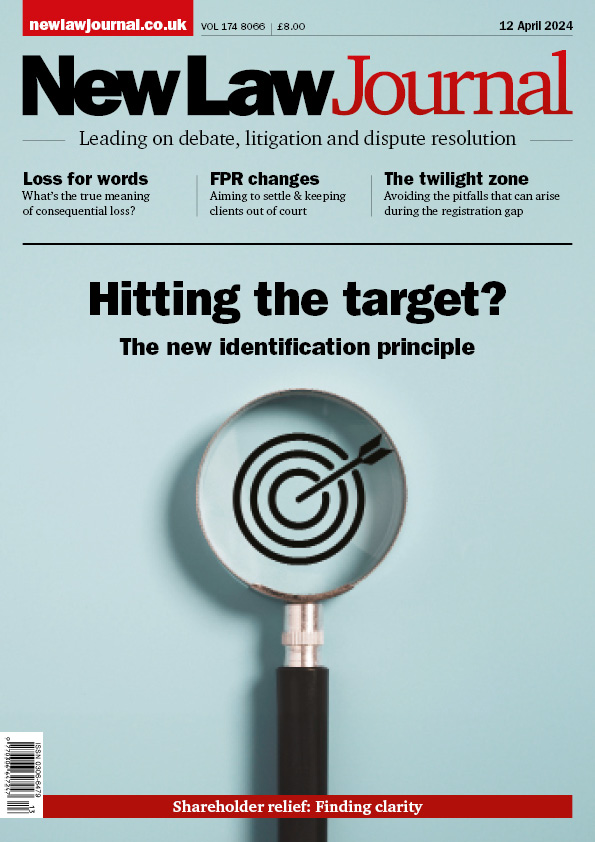THIS ISSUE

The new identification principle should make it easier to successfully prosecute companies. But what if the difficulties are based on a misdiagnosis, asks Maia Cohen-Lask
The Court of Appeal has set a clearer path for shareholders seeking multiple forms of relief following wrongdoing in a company. Lizzie Shimmin & Sol Gelsomino report
With FPR changes focusing on non-court solutions, Caroline Bowden suggests solicitors send clients to a MIAM, aim to settle and try to keep appropriate clients out of court
The Spring Budget brought several tweaks to property taxation & CGT, which are likely to impact the wider real estate market, write Chris Gaunt & Caroline Styan
Even in times of uncivilised warfare, natural law matters—as shown so vividly in Breaker Morant and other classic movies, writes Mark Pawlowski
The Swedish activist pleaded not guilty to a public order offence—and the court agreed. Neil Parpworth explains the ruling
Paul Magrath recalls the chequered history of law reporting prior to the establishment of a Council of Law Reporting in 1865
The registration gap is a risky period in a property purchase. Tricia Hemans & Daniel Black explain how to avoid the pitfalls
What’s the true meaning of ‘consequential loss’? C Haward Soper consults the case law—and that other authoritative source, ChatGPT…
MOVERS & SHAKERS

NLJ Career Profile: Ken Fowlie, Stowe Family Law
Ken Fowlie, chairman of Stowe Family Law, reflects on more than 30 years in legal services after ‘falling into law’

Gardner Leader—Michelle Morgan & Catherine Morris
Regional law firm expands employment team with partner and senior associate hires

Freeths—Carly Harwood & Tom Newton
Nottinghamtrusts, estates and tax team welcomes two senior associates
NEWS
Children can claim for ‘lost years’ damages in personal injury cases, the Supreme Court has held in a landmark judgment
The cab-rank rule remains a bulwark of the rule of law, yet lawyers are increasingly judged by their clients’ causes. Writing in NLJ this week, Ian McDougall, president of the LexisNexis Rule of Law Foundation, warns that conflating representation with endorsement is a ‘clear and present danger’
Holiday lets may promise easy returns, but restrictive covenants can swiftly scupper plans. Writing in NLJ this week, Andrew Francis of Serle Court recounts how covenants limiting use to a ‘private dwelling house’ or ‘private residence’ have repeatedly defeated short-term letting schemes
Artificial intelligence (AI) is already embedded in the civil courts, but regulation lags behind practice. Writing in NLJ this week, Ben Roe of Baker McKenzie charts a landscape where AI assists with transcription, case management and document handling, yet raises acute concerns over evidence, advocacy and even judgment-writing
The Supreme Court has drawn a firm line under branding creativity in regulated markets. In Dairy UK Ltd v Oatly AB, it ruled that Oatly’s ‘post-milk generation’ trade mark unlawfully deployed a protected dairy designation. In NLJ this week, Asima Rana of DWF explains that the court prioritised ‘regulatory clarity over creative branding choices’, holding that ‘designation’ extends beyond product names to marketing slogans







